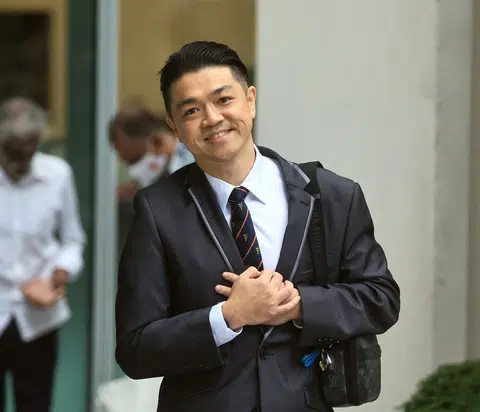Iris Koh edits social media posts after prosecution says they are in contempt of court
Healing the Divide founder Iris Koh has edited and deleted some of her social media posts after certain parts of them were flagged in court by the prosecution as being sub judice.
Sub judice, which is a form of contempt of court, refers to actions that can unduly influence court proceedings.
Deputy Public Prosecutor Kelvin Chong had raised concerns that the anti-vaccine group founder's posts on X and Facebook were sub judice on the fifth day of her trial on March 4.
Koh, 49, is facing a joint trial with suspended doctor Jipson Quah, 36, and his former clinic assistant Thomas Chua Cheng Soon, 43.
The three had allegedly conspired to falsely inform the Health Promotion Board that patients had been given Covid-19 vaccination when they had not.
DPP Chong cited one of her posts dated Feb 26, where Koh claimed that Superintendent Tan Pit Seng, the head of investigation at Central Police Division, had a "secret meeting" with Quah.
According to Koh's posts, Quah alleged that during this meeting, he was asked to "embellish his statements" against her so he could get bail.
Noting that such posts could possibly amount to contempt of court as the trial is still ongoing, DPP Chong urged the court to direct Koh not to make such comments online.
The prosecutor pointed to another of Koh's posts that claimed the trial will reveal "how high-ranking government officials play a part" in the prosecution of Koh, Quah and Chua in the management of Singapore's Covid-19 vaccination issues.
DPP Chong said this was a "live issue" and emphasised that Koh should refrain from making such comments.
In response, Koh's lawyer, Mr Wee Pan Lee, said he had not seen these social media posts and thus would not be in a position to say if they contained comments that were sub judice.
District Judge Quan then told Mr Wee to view the posts and advise his client accordingly when the court adjourned for lunch.
Following the adjournment, Mr Wee said he had discussed this matter with Koh, who has "taken some steps" regarding these posts.
DPP Chong told the judge that the prosecution team is in the process of looking at the amendments, adding: "We won't have to trouble your honour with this matter and hopefully moving forward, we won't need to either."
In response, Judge Quan said: "I think that all we are trying to do here is to safeguard the integrity of the process as best we can."
Addressing Koh, he said: "While I understand your interests in reporting about your case, there has to be certain parameters...
"My advice to you, if I were to give any suggestion, is to try and stay clear from reporting anything unless you are very confident that what you are reporting is as accurate as possible."
The court then continued with an ancillary hearing - or a trial within a trial - to determine the admissibility of six police statements in court as evidence.
This ancillary hearing began during the first phase of the trial in December 2024 when Quah's defence lawyer Adrian Wee objected to these statements being admitted in court as evidence.
Mr Wee said previously that this was because the statements were recorded under circumstances where there was threat, inducement or promise.
During the ancillary hearing on March 4, Dr Lim Pei Ling from the Institute of Mental Health (IMH) was called as a prosecution witness.
Dr Lim said she had reviewed Quah in January 2022 after his arrest. Quah had told police officers about his low mood and was referred to IMH, she said.
In her memo following her assessment of Quah, Dr Lim said he held some grudge against Koh but "feels he has to take responsibility for what he did".

Quah also cited that he felt that life was meaningless but denied any suicide ideation, she said.
When Dr Lim asked if he had concerns regarding finances, Quah said no, noting that both his girlfriend and wife were working, and he would be able to manage.
During cross-examination, Mr Wee asked Dr Lim if Quah had difficulty sleeping while in custody and had nightmares related to his arrest. She said yes.
Mr Wee then asked Dr Lim: "Based on this information provided, would you say that he was distressed while being kept in custody?"
Dr Lim replied yes, and added that this manifested in a few ways for Quah, including not being able to sleep and eat well.
The trial continues.
Nadine Chua for The Straits Times